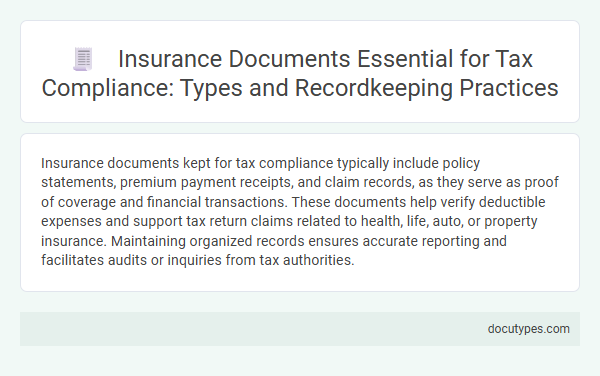Insurance documents kept for tax compliance typically include policy statements, premium payment receipts, and claim records, as they serve as proof of coverage and financial transactions. These documents help verify deductible expenses and support tax return claims related to health, life, auto, or property insurance. Maintaining organized records ensures accurate reporting and facilitates audits or inquiries from tax authorities.
Introduction to Insurance Documents for Tax Compliance
What types of insurance documents are essential for tax compliance? Insurance policies, premium payment receipts, and claim statements are key documents required to ensure proper tax reporting. These records help verify deductions, credits, and taxable income related to insurance transactions.
Importance of Insurance Documentation in Tax Filing
Insurance documentation plays a critical role in ensuring accurate tax filing and compliance. These documents provide essential proof of premiums paid, claims made, and coverage periods needed for tax audits.
Common types of insurance documents kept for tax compliance include premium payment receipts, policy statements, claim settlement letters, and annual statements from insurers. Proper organization of your insurance records helps support deductions and credits claimed on your tax returns.
Types of Insurance Policies Relevant for Tax Purposes
Maintaining specific insurance documents is essential for accurate tax compliance and record-keeping. Various types of insurance policies impact tax reporting and deductions.
- Health Insurance Policies - Documents such as Form 1095-A, 1095-B, or 1095-C verify coverage and may affect tax credits and penalties.
- Life Insurance Policies - Records detail premiums paid and any taxable benefits like loans or dividends, influencing estate and income tax filings.
- Property and Casualty Insurance Policies - These include homeowner's or auto insurance documents relevant for claiming casualty loss deductions on tax returns.
Essential Insurance Documents Required by Tax Authorities
Essential insurance documents required by tax authorities include policy contracts, proof of premium payments, and claim records. These documents serve as critical evidence for tax deductions and compliance verification.
Receipts for premiums paid and detailed policy statements must be retained to support claims during tax audits. Your accurate record-keeping of these insurance documents ensures smooth tax reporting and avoids potential penalties.
Understanding Premium Payment Records
Insurance documents play a crucial role in tax compliance, particularly premium payment records. These records serve as proof of payments made toward your insurance policies.
Premium payment records include receipts, bank statements, and policy statements that detail the amounts and dates of payments. Maintaining accurate premium payment records helps substantiate deductions or credits claimed on tax returns. You should keep these documents organized and accessible for potential audits or reviews by tax authorities.
Documentation for Claim Settlements and Payouts
Insurance documents crucial for tax compliance include claim settlement records, payout receipts, and policy statements. These documents verify the amounts received and expenses claimed, ensuring accurate reporting to tax authorities. Your careful maintenance of these records supports transparent audits and smooth tax filing processes.
Electronic vs. Physical Insurance Records: Pros and Cons
| Type of Insurance Document | Description | Electronic Insurance Records | Physical Insurance Records |
|---|---|---|---|
| Policy Documents | Contain detailed terms and coverage information to verify deductions and claims. |
|
|
| Premium Payment Receipts | Proof of payments necessary for claiming tax benefits. |
|
|
| Claim Statements | Document claims submitted and payouts received, important for tax audits. |
|
|
| Endorsements and Riders | Supplementary documents modifying original insurance contracts. |
|
|
| Summary | You benefit from maintaining electronic insurance records for tax compliance due to their accessibility, security options, and efficient organization, while physical records serve as tangible backups but carry risks of damage and loss. | ||
Best Practices for Organizing Insurance Documents
Maintaining accurate insurance documents is essential for tax compliance and efficient financial management. Organizing these records properly ensures quick access during audits or tax filing.
- Policy Documents - Keep copies of all insurance policies to verify coverage and premiums paid throughout the tax year.
- Claim Records - Retain detailed records of claims filed, including correspondence and settlement amounts, for potential tax deductions or audits.
- Payment Receipts - Store receipts and proof of premium payments as evidence of expenses for tax reporting purposes.
Record Retention Periods for Insurance-Related Tax Compliance
Insurance documents essential for tax compliance include policy agreements, premium payment records, and claim statements. These records must often be retained for a minimum of seven years to satisfy IRS regulations and support audit processes. You should maintain these documents securely to ensure accurate reporting and verification during tax assessments.
What Types of Insurance Documents Are Kept for Tax Compliance? Infographic

